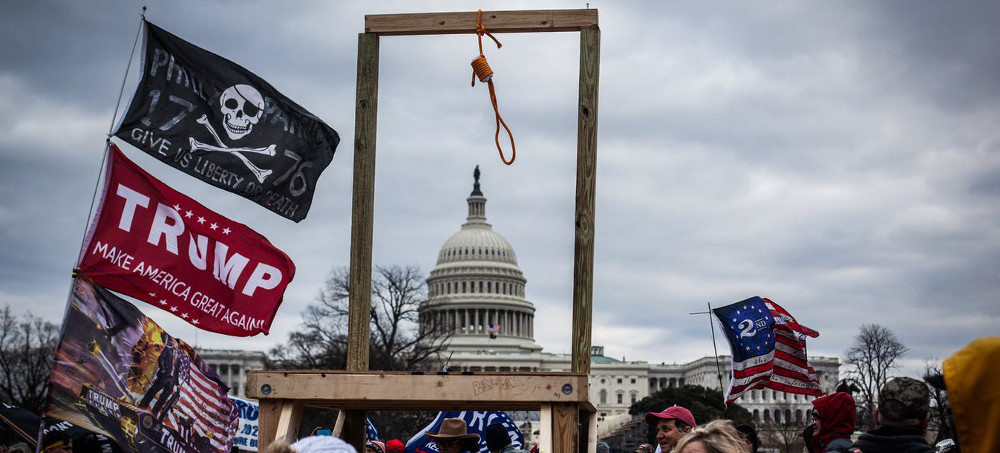The Feds Just Took the January 6 Cases to a Whole New Level
Pilar Melendez The Daily Beast 'A new charge against alleged rioters is likely as far as the Justice Department can go short of indicting a politician or elected official, experts said.' (photo: Getty)
'A new charge against alleged rioters is likely as far as the Justice Department can go short of indicting a politician or elected official, experts said.' (photo: Getty) The Feds Just Took the January 6 Cases to a Whole New Level
Pilar Melendez The Daily Beast
A new charge against alleged rioters is likely as far as the Justice Department can go short of indicting a politician or elected official, experts said.
Stewart Rhodes, the 56-year-old founder of the Oath Keepers, and ten other affiliates of the far-right military group, were charged Thursday with seditious conspiracy in a superseding indictment after prosecutors said they sought to “oppose by force the execution of the laws governing the transfer of presidential power” from former President Donald Trump to Biden.
This charge, which means a maximum sentence of 20 years in prison, is by far the most serious yet lobbed at anyone in connection with organizing the riot, and is likely as far as the Justice Department can go short of indicting a politician or elected official, experts said.
“I’m surprised but not shocked,” Noah Feldman, a Harvard legal historian, told The Daily Beast about the sedition charges on Thursday. “It’s a hard charge to prove. And it has this distinctive history of being used by governments who overreached in prosecuting their citizens.”
Legal experts canvassed by The Daily Beast explained that in order for the Department of Justice to secure the indictment, they had to convince a grand jury that militia members may have had an agreement to overthrow the government or prevent the execution of a U.S. law by force. The charge also requires proof of at least one overt act of trying to further the conspiracy.
“Seditious conspiracy is a big deal. The last time it was charged was in 2010. The seal has been broken,” Palm Beach County State Attorney Dave Aronberg tweeted Thursday.
To put it simply, former federal prosecutor Neama Rahmani told The Daily Beast, the “seditious conspiracy” charge and what most people understand as insurrection are “effectively the same.” The only difference, he noted, is that sedition is an unlawful agreement, while insurrection is a substantive act.
“The Department of Justice must have evidence of an agreement, such as planning, coordination, and direction, particularly in messages from Rhodes or statements by cooperating defendants” to prove the charge, Rahmani said.
The indictments unsealed on Thursday do, in fact, add new evidence to already-substantial troves of chat logs prosecutors say show detailed planning between Oath Keepers members.
The Capitol was also breached on national television—and resulted, directly or indirectly, in five deaths and injuries to hundreds of law enforcement officers trying to protect the building. And even though there is no indication that Rhodes physically entered the building, prosecutors allege he maintained control over the Oath Keeper group throughout the whole insurrection, and is seen on video assembling them outside the Capitol.
“The purpose of the conspiracy was to oppose the lawful transfer of presidential power by force, by preventing, hindering or delaying by force the execution of the laws governing the transfer of power, including the Twelfth and Twentieth Amendments to the Constitution,” the indictment says.
The indictment adds that beginning in Nov. 2020, Rhodes began “disseminating messages on encrypted applications that encouraged co-conspirators” to oppose the transfer of presidential power to Joe Biden.
“We aren’t getting through this without civil war. Too late for that. Prepare your mind, body, spirit,” Rhodes allegedly wrote in one message to his other co-conspirators. “It will be a bloody and desperate fight. We are going to have a fight. That can’t be avoided.”
Rhodes has repeatedly denied his involvement in the riots, and there is no evidence he entered the Capitol building that day. In a statement Thursday to The Daily Beast, a defense lawyer for Rhodes and an alleged co-conspirator slammed the new charges—and said they were filed without “any new facts alleged.”
“Faced with criticism from leading Democrats for not supporting their Leftist narrative, the prosecutors have just slapped a new label on the false allegations already made,” he said. “But I see no facts that would support the new charges.”
While the new charges may serve to satisfy Americans clamoring for more cases against not just people caught on video committing violence, but those who helped set the stage for the riots, landing convictions won’t be easy.
After all, Feldman said, the sedition charge means showing “an element of intent to overthrow the government”—even as the Oath Keepers have long falsely maintained they are themselves guardians against some sort of conspiracist takeover of the U.S.
“That’s not clear, that interfering with an election result is the same as overthrowing the government,” Feldman told The Daily Beast of the riots, noting that while they turned out to be violent, the defendants will almost certainly argue that was not their intent.
But the charges also come in the context of a House probe that has seen subpoenas of a slew of lawmakers, politicians, and other public figures. They may not satiate progressive calls for a more wholesale government legal war on those who stoked conspiracist violence, but it arguably represents a step in that direction.
“We won’t see anything more serious until prosecutors indict former President Trump or members of his administration,” Rahmani said.
